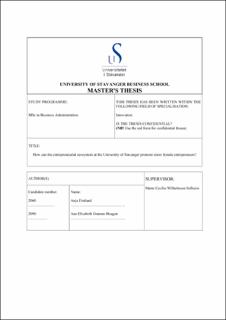| dc.description.abstract | In light of the identified gender gap when it comes to entrepreneurship in Norway, this thesis aims to investigate the role of universities in promoting more female entrepreneurs. The increased focus on entrepreneurship and the underrepresentation of female entrepreneurs thus created the basis for the following research question: “How can the entrepreneurial ecosystem at the University of Stavanger promote more female entrepreneurs?”
The thesis is based on an exploratory research design and a qualitative research method. The primary data was collected through qualitative semi structured interviews and analyzed in accordance with the utilized theory and documents. The 12 participants that were interviewed in this research are all students at the University of Stavanger (UiS). Of the 12 participants, 50% are women and 50% are men.
The thesis finds that the entrepreneurial ecosystem at UiS needs to foster women's entrepreneurial intention (EI) in order to promote more female entrepreneurs. This research has identified three measures the entrepreneurial ecosystem at UiS can implement in order to develop female students EI. These measures are to provide and expose the students with more female role models, to enhance the quality and accessibility of courses that are offered and last but not least, to better the marketing and information about entrepreneurship as an occupation, as well as the entrepreneurial offers at UiS. In conclusion, female students EI can be increased by offering more practical training, providing more female entrepreneur role models and generally enhancing the marketing and information sharing about entrepreneurship at UiS. This can strengthen the female students' knowledge, competence and subjective perceptions about their own capabilities. Further, it can reduce their perceived risk and uncertainty surrounding entrepreneurship. By implementing these measures, UiS can increase the entrepreneurial intention rate among female students and as such, possibly promote more female entrepreneurs in Norway.
Key Words: entrepreneurship, entrepreneurial intention, gender stereotypes, social norms, role models, entrepreneurial education, entrepreneurial activities, economic and societal development, the University of Stavanger | |
